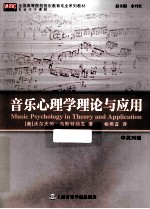图书介绍
音乐心理学理论与应用 中英对照2025|PDF|Epub|mobi|kindle电子书版本百度云盘下载

- (德)马斯特纳克著 著
- 出版社: 上海:上海音乐学院出版社
- ISBN:9787806929070
- 出版时间:2014
- 标注页数:446页
- 文件大小:73MB
- 文件页数:462页
- 主题词:音乐心理学-高等学校-教材
PDF下载
下载说明
音乐心理学理论与应用 中英对照PDF格式电子书版下载
下载的文件为RAR压缩包。需要使用解压软件进行解压得到PDF格式图书。建议使用BT下载工具Free Download Manager进行下载,简称FDM(免费,没有广告,支持多平台)。本站资源全部打包为BT种子。所以需要使用专业的BT下载软件进行下载。如BitComet qBittorrent uTorrent等BT下载工具。迅雷目前由于本站不是热门资源。不推荐使用!后期资源热门了。安装了迅雷也可以迅雷进行下载!
(文件页数 要大于 标注页数,上中下等多册电子书除外)
注意:本站所有压缩包均有解压码: 点击下载压缩包解压工具
图书目录
译文部分3
第一章 心理学与音乐心理学3
1.1 音乐心理学相关领域4
1.1.1 心理学思想流派4
1.1.2 心理学研究的焦点13
1.2 个体、音乐及音乐教育17
1.3 当代音乐心理学研究领域20
第二章 音乐感知与审美体验22
2.1 通感、文学与心理美学22
2.2 心理声学和神经心理学24
2.3 音乐格式塔26
2.4 音乐感知和“美”的进程28
2.5 听觉与环境30
2.6 音乐记忆与绝对音高32
第三章 音乐教育应关注之要点33
3.1 音乐教育作为文化和社会现象33
3.2 影响音乐学习的四种条件35
3.2.1 天赋与基因/遗传条件35
3.2.2 音乐学习的心理—生理条件37
3.2.3 学习技巧与策略47
3.2.4 学习的外部条件53
3.3 基本变量实体之人格心理学理论57
第四章 音乐创作与表演59
4.1 音乐能力与音乐作品59
4.2 知识与技巧60
4.3 真实性与个性61
4.4 创造与革新64
4.5 社会文化功能与社会交流66
4.6 学习与比赛68
第五章 作为中小学课程内容的音乐心理学70
5.1 教授音乐心理学的根据70
5.2 课堂实践73
5.2.1 简单的实验74
5.2.2 主动争取和创造学习机会75
5.2.3 听觉神经生理学76
第六章 在校学生的行为和心理问题78
6.1 学生发育阶段的“攻击性”行为及教育的作用78
6.2 学校和教师作为深蕴心理象征79
6.3 成长和学习障碍81
6.4 儿童受虐待和被忽视的问题85
6.5 文化适应问题87
6.6 行为问题和行为障碍89
6.7 心理障碍和精神障碍93
6.8 融合教育95
第七章 特殊音乐教育104
7.1 诊断及适用范围104
7.2 特殊音乐教育的学派和观念107
7.2.1 奥尔夫音乐治疗107
7.2.2 诺道夫-罗宾斯音乐治疗109
7.2.3 维罗尼卡项目111
7.2.4 声音功效(Sound Work)113
第八章 音乐治疗114
8.1 音乐治疗的结构与特征115
8.2 音乐治疗的流派与方法117
8.2.1 多样联合表达疗法及音乐格式塔疗法117
8.2.2 声音功效119
8.2.3 民族音乐治疗129
第九章 音乐心理学研究方法134
9.1 哲学方法134
9.2 现象学研究方法135
9.3 实证方法138
9.3.1 数据和应用范围138
9.3.2 描述性统计分析141
9.3.3 统计测试142
9.3.4 研究设计152
9.3.5 数据解读153
9.3.6 定义,数据获取工具和测试153
9.4 神经心理学研究方法156
第十章 神经心理学基本原理161
10.1 脑的结构与功能161
10.2 听觉系统163
10.3 感知系统与感知统合166
10.4 运动系统169
10.5 认知能力176
10.6 情绪/情感176
10.7 记忆180
10.8 创造力181
10.9 马斯特纳克转换定理182
后记——意犹未尽的话&沃尔夫冈·马斯特纳克184
原文部分187
Foreword187
1 Psychology and Music Psychology189
1.1 Disciplines of Music Psychology190
1.1.1 Psychological Schools of Thought190
1.1.2 Psychological Foci202
1.2 Man,Music and Music Education208
1.3 Fields of Contemporary Music Psychology212
2 Perception and Aesthetic Experience215
2.1 Common Sense,Literature and Psychological Aesthetics215
2.2 Psychoacoustics and Neurophysiology217
2.3 Musical Gestalt220
2.4 Processing of Perception and Beauty223
2.5 Ear and Environment226
2.6 Musical Memory and the Mystery of the Absolute Pitch229
3 Factors of Musical Learning231
3.1 Music Education as a Cultural and Social Phenomenon231
3.2 Four Domains Influencing Musical Learning234
3.2.1 Talent and Genetic/Hereditary Conditions234
3.2.2 Psycho-physiological Conditions237
3.2.3 Learning Techniques and Strategies253
3.2.4 External Conditions262
3.3 The Personal ity-Psychological Theory of Basic Variable Entities267
4 Professional Skills:Composition and Interpretation270
4.1 Musicianship and Musical Output271
4.2 Techniques and Knowledge272
4.3 Authenticity and Individuality274
4.4 Creativity and Innovation277
4.5 Socio-cultural Functions and Communication279
4.6 Studies and Competitions283
5 Teaching Music Psychology at School285
5.1 Four Reasons for Teaching Music Psychology286
5.2 Insights into Classroom-Practise291
5.2.1 Easy Experiments291
5.2.2 Air China,hello293
5.2.3 The Neurophysiology of Hearing294
6 Behavioural and Mental Problems in Classroom-Education297
6.1 Developmental Aggressiveness and Educational Frames297
6.2 School and Teacher as Depth-psychological Symbols299
6 3 Developmental and Learning Problems301
6.4 Abuse and Neglect307
6.5 Acculturation Problems311
6.6 Behavioural Problems and Disorders313
6.7 Mental and Psychiatric Disorders318
7 Special Music Education335
7.1 Diagnosis and Domains335
7 2 Schools and Concepts of Special Music Education339
7.2.1 Orff-Music-Therpapy340
7.2.2 Nordoff-Robbins Music Therapy343
7.2.3 The Veronika-Project346
7.2.4 Sound Work348
8 Music Therapy350
8.1 Structures and Features of Music Therapy351
8.2 Schools and Methods355
8.2.1 Intermodal Expressive Therapy and Music Gestalt-Therapy355
8.2.2 Sound Work358
8.2.3 Ethno-Music-Therapy373
9 Methods of Music Psychological Research379
9.1 Philosophical Methods379
9.2 Phenomenological Methods380
9.3 Empirical Methods385
9.3.1 Data and Ranges386
9.3.2 Descriptive Statistics389
9.3.3 Statistical Tests391
9.3.4 Research Settings402
9.3.5 Interpretation403
9.3.6 Definitions,Data-gaining Tools and Tests404
9.4 Neuro-psychological Methods408
10 Neuro-psychological Basics414
10.1 Parts and Functions415
10.2 The Auditory System417
10.3 Sensory System and Sensory Integration422
10.4 The Motor System426
10.5 Cognition434
10.6 Emotion434
10.7 Memory440
10.8 Creativity441
10.9 Mastnak's Transition-Theorem443
A Word at No-End445
热门推荐
- 948468.html
- 1128650.html
- 1935500.html
- 3653227.html
- 615564.html
- 132305.html
- 2914264.html
- 3016992.html
- 3795428.html
- 3205516.html
- http://www.ickdjs.cc/book_176288.html
- http://www.ickdjs.cc/book_453369.html
- http://www.ickdjs.cc/book_2022754.html
- http://www.ickdjs.cc/book_2830686.html
- http://www.ickdjs.cc/book_3070219.html
- http://www.ickdjs.cc/book_3768635.html
- http://www.ickdjs.cc/book_420408.html
- http://www.ickdjs.cc/book_1414985.html
- http://www.ickdjs.cc/book_526287.html
- http://www.ickdjs.cc/book_2953844.html